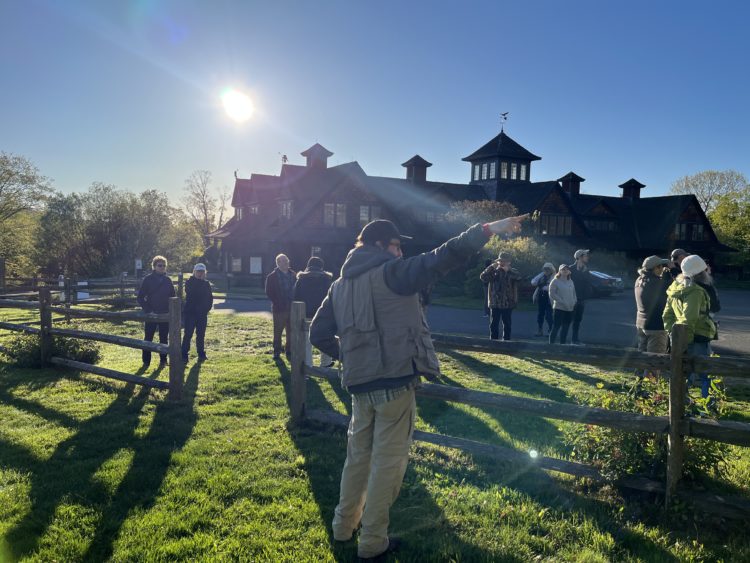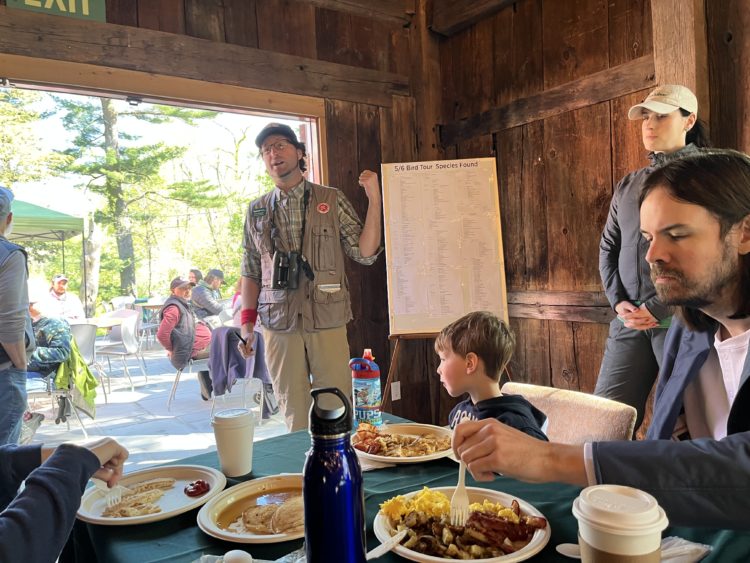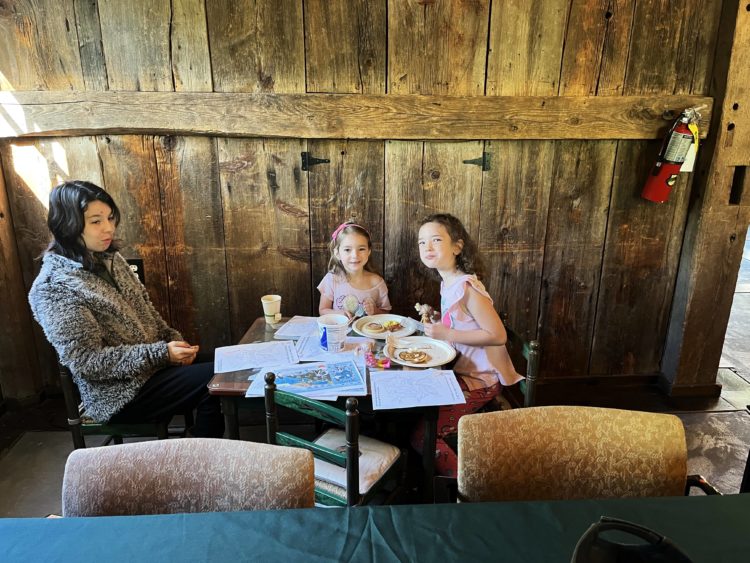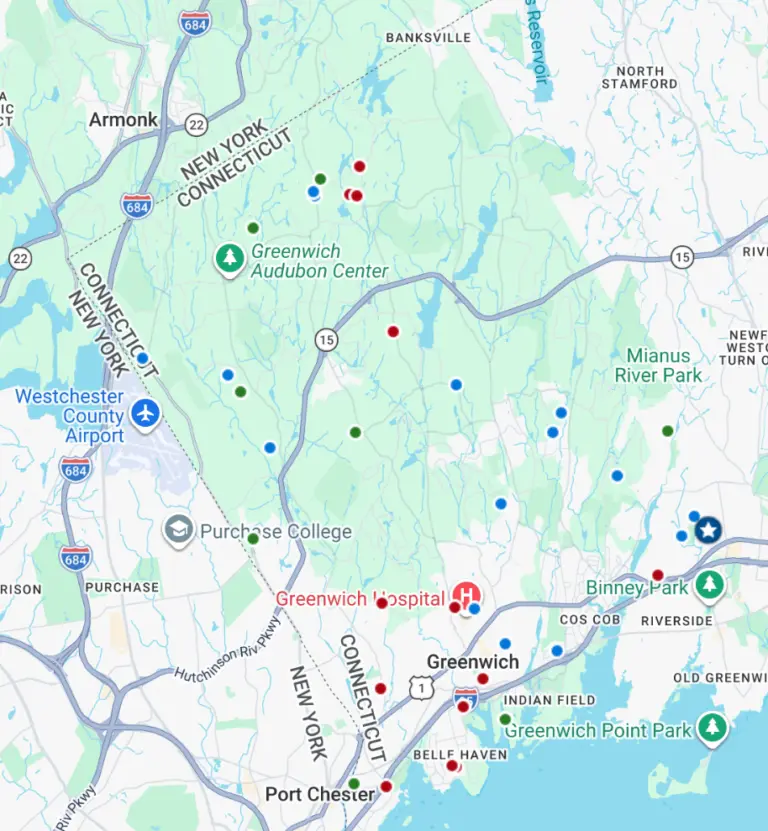
By Anne W. Semmes
The Audubon Bird Breakfast returned on a brilliant sunny Saturday last at the Audubon Center. Promptly at 7 a.m. some 50 birders arrived to be divided up into three groups by Senior Education Coordinator Ryan MacLean, with one group led by Cynthia Ehlinger to explore the nearby Fairchild Gardens Sanctuary, with the other two groups to be led across some of the Center ‘s 285 acres by MacLean and Matt Popp.
Many of the migratory birds we learned were just touching down at the Center on their way north to the boreal forest “nursery” told MacLean to the gathering, while others might “still be in Brazil.” Overlooking the crowd atop a tree was spotted the Eastern Kingbird. “He’s in the flycatcher family,” told MacLean,
“And likes to be at the top of trees to hunt insects.”
Following MacLean’s group down behind the Center building we see a Goldfinch with our binoculars. “The Goldfinch turns into a neon yellow color in spring,” he told, “and he has an up and down flight, and a song that sounds like “potato chip, potato chip.”
We were treated to a number of song descriptions of found birds on our tour: “The Common Yellowthroat sings, “Witichi, witichi, witichi…The warbling vireo sings, “I will squeeze you; I will squeeze you, till you squeak…The Yellow Warbler sings “trees, trees, whispering trees.” And how many bird songs does a Mockingbird sing? “Two hundred – including a car alarm, a Carolina Wren and an Eastern Phoebe.”
A favorite amongst many, a Baltimore Oriole was seen high up in a tree. “It arrived two or three days ago,” said MacLean. “Some will return to their hanging nests while others must build their own.” He shared a surprise finding of an arriving Eastern Bluebird pair. “They are making their nest in their traditional hole in a tree in the apple orchard,” he showed, and not returning to their bluebird boxes so often stolen away by other species.
But then it was time for our free Bird Breakfast after our free bird tour that had brought into view some 19 migratory birds, including a Coopers Hawk flying overhead.
We entered the historic Asnes Barn with its vintage wooden walls and were welcomed by a crackling fire and the smell of bacon. Standing by the fireside was Gary Palmer, recalling those early Bird Breakfasts dating back 60 years or more when Roger Tory Peterson had attended. Gary had his own take on a Mockingbird’s repertoire: “The Mockingbird sings three songs, a Catbird once and a Brown Thrasher twice.”
Already feasting on their breakfast of pancakes, eggs and bacon were a couple of birders in-the-making, four-year-old Marianna Popp, and her sister Julianna Popp, age 7, there with Audubon teen board member Grace Popp. Also bringing breakfast to table was Christina Buccieri, age 14, having grown up at Audubon, sharing that her butterfly garden is on its way to becoming a registered Monarch Way Station.
With all 100 attendees enjoying their breakfast Ryan MacLean gave introductory remarks reminding us that the Audubon Center is the oldest Audubon education center in the U.S. And he added that the Spring Bird Breakfast, though missing for the last three years, is the Center’s longest running annual event. “So, we cannot be more grateful to have all of you here.”
A shoutout of thanks was given by MacLean to those in the kitchen. “We want to thank our Facilities Manager, John Fairty, our amazing volunteers, and teen board members who are assisting with the food. And it is our wonderful pleasure to also introduce many of you to our newest member of the Audubon family, our new Center director, Rochelle Thomas.”
Thomas recalled MacLean coming to her in her first couple of weeks, saying, “Hey, there used to be this really fun day we would have, would you consider returning the Bird Breakfast?” “Sure,” she replied.
“What makes this event even more special,” continued MacLean, “is this event has morphed and evolved over the years into becoming not only a day for us to come together, to celebrate our birds, but to raise awareness for the Jurassic issues that they’re facing. Nearly 300 species of our birds are in danger of extinction over climate change. And over the last 30 years, this event is also centered around World Migratory Bird Day, which is run in partnership with many organizations in collaboration with Environment for the Americas. Every year they have a conservation theme to raise awareness for how simple things we can do in our lives affect bird’s lives. This year’s theme is water and how water is so crucial to all of our native and migratory bird species.”
MacLean also welcomed members of the newly partnering Connecticut Ornithology Association, then shared that also present was “someone pivotal in the organization of this event since its early inception, not to mention shaping the amount of bird community science we do on our property today – Gary Palmer. Whether it’s founding our Quaker Ridge Hawk Watch, our summer bird counts, compiling our Christmas bird counts, and breeding bird surveys.” Gary, he told would soon be celebrated on June 8 with the Audubon Connecticut Lifetime Achievement Award at the Audubon’s Environmental Leadership Awards dinner.
Add to that event the presence of another previous lifetime achievement award winner, “our dear friend and former head naturalist of 43 years, Ted Gilman” who will present the award to Gary,. “So, we hope you can join us for what will be a very, very special day.”
Finally came MacLean proceeding with the bird checklist, calling out each species whether spotted. The total? “That is 62 bird species in the morning. And we could still add more if you come and sit outside, get more coffee, keep listening, keep watching.”
For those who missed out, he told, “We’re going to have one more spring migration bird tour on Saturday May 20 followed by two sessions where the National Audubon Society’s Director of Bird Conservation Corrie Folsom-O’Keefe will be doing live bird banding. “To register, visit https://tickets.audubon.org/greenwichauduboncenter/events/d3dbc7a7-3824-0c68-0236-0c41ab16cebb?fbclid=IwAR0sZ1MtLxfgy1uZdwIUfbdd0EJHY1AcR3C_5JKX_K_FFBzkouhECzZEdI4





